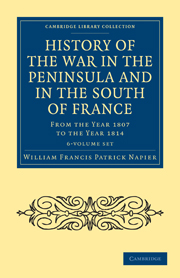 Leonard Jenyns (1800–93). This clergyman, naturalist, friend and colleague of Darwin and brother-in-law and biographer of Henslow (and thus somehow faintly related to Joseph Hooker, who was Henslow’s son-in-law) changed his name to Blomefield at the advanced age of 71, in order to inherit £7000 from a distant relative.
Leonard Jenyns (1800–93). This clergyman, naturalist, friend and colleague of Darwin and brother-in-law and biographer of Henslow (and thus somehow faintly related to Joseph Hooker, who was Henslow’s son-in-law) changed his name to Blomefield at the advanced age of 71, in order to inherit £7000 from a distant relative.
James Orchard Halliwell-Phillipps (1820–89). The Shakespearian scholar and controversialist, co-author of our Cambridge Jokes (now over 1,000 copies sold), had an appalling relationship with his father-in-law, Sir Thomas Phillipps. They both had antiquarian interests, but when the younger man met and began courting Sir Thomas’s daughter, and eventually married her, he was visited by the full wrath of her father, who according to the ODNB, ‘rained down accusations of theft, misrepresentation, and sharp practice’ on his head until his death in 1872. He had left a will stipulating that neither his son-in-law nor his own daughter should ever enter his house, but in fact the house (and its valuable library) passed by her grandfather’s will to his daughter, provided that she kept the Phillipps name, which she and her husband both adopted.
Edward Bootle (1771–1853). J.B.S. Morritt of Rokeby was joined on his travels across Europe by ‘Bootle and Wilbraham’, who were brothers. Their father had changed his name to Bootle in order to inherit an estate, but his younger son Randal kept the Wilbraham name. The older, Edward, was Edward Wilbraham Bootle for a bit, but in 1814, changed himself by royal licence into Edward Bootle Wilbraham. (An active politician, he was made 1st Baron Skelmersdale in 1828. He thus founded the dynasty which resulted in the completely wonderful Broadleigh Gardens, purveyors of the finest bulbs.)
Charles Langdale (1787–1868). The champion of Mrs Fitzherbert was originally a Stourton, but ‘assumed his mother’s maiden name by royal licence, in order to comply with the conditions of the will of Philip Langdale of Houghton, Yorkshire’ (ODNB).
Davies Gilbert (1767–1839). This protégé of Sir Joseph Banks and President of the Royal Society was, like Sir Humphry Davy, who preceded him in the office, a Cornishman. He was born Davies Giddy, but changed his name in order to inherit the estate of one Thomas Gilbert of Sussex, whose niece and heiress he had married. (Shame really: there could have been some harmless fun with ‘The PRS is a bit Giddy tonight’, etc.)
Giddy/Gilbert was what might now be called an applied mathematician: he worked on theoretical problems with a bearing on engineering projects like suspension bridges and steam engines. He was also an M.P., and served on many parliamentary committees on scientific matters, including the Board of Longitude, the establishment of the observatory at the Cape of Good Hope, weights and measures, and currency reform. Banks had intended that Gilbert should succeed him as President of the Society, but the superior claims of Gilbert’s younger colleague Humphry Davy kept him from the position until Davy was forced to resign because of ill health in 1827. The downside of Gilbert’s elevation was that he then had the dubious task of dealing with the bequest of the earl of Bridgewater…
In addition to his scientific activities, Gilbert had a hobby which will be revealed soon, with our 2013 Christmas Cracker – so watch this space!
Caroline



Pingback: A Country Clergyman | Cambridge Library Collection Blog
Pingback: Carols, jokes, and the Dickensian Christmas | fifteeneightyfour
Pingback: Christmas Books | Cambridge Library Collection Blog
Pingback: Maria Anne Smythe | Cambridge Library Collection Blog
Pingback: More Travellers to the Nile | Cambridge Library Collection Blog
Pingback: A Traveller In An Antique Land | Cambridge Library Collection Blog
Pingback: The Father of Assyriology | Cambridge Library Collection Blog
Pingback: Economic Botany | Cambridge Library Collection Blog
Pingback: Lord Herbert of Cherbury | Cambridge Library Collection Blog
Pingback: The Bountiful Lady | Cambridge Library Collection Blog
Pingback: Alas, Poor Dodo! | Cambridge Library Collection Blog
Pingback: Tulipomania | Cambridge Library Collection Blog
Pingback: Names | Professor Hedgehog's Journal
Pingback: St Lubbock And His Pet Wasp | Professor Hedgehog's Journal
Pingback: OK, So Who Did Kill Cock Robin? | Professor Hedgehog's Journal